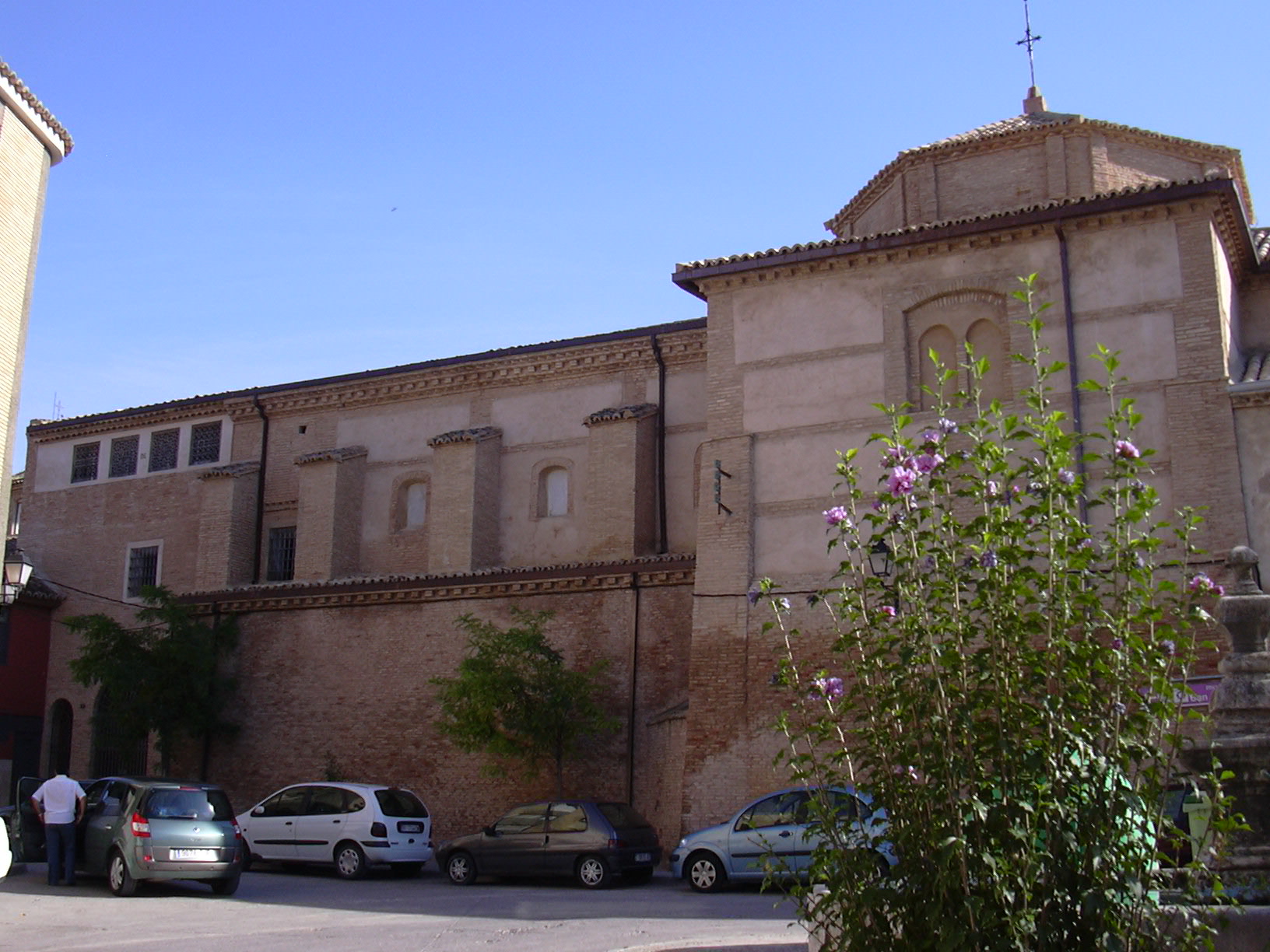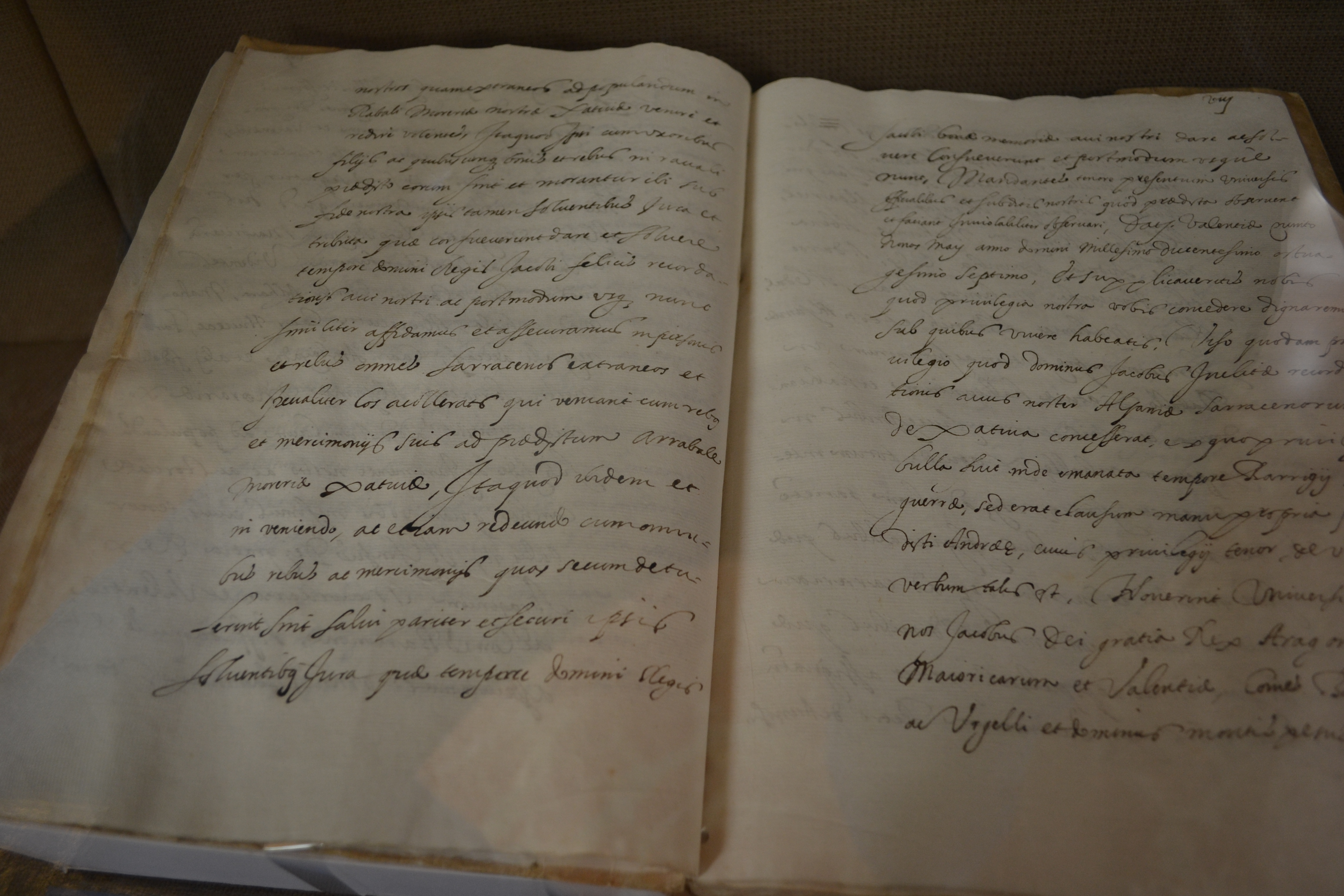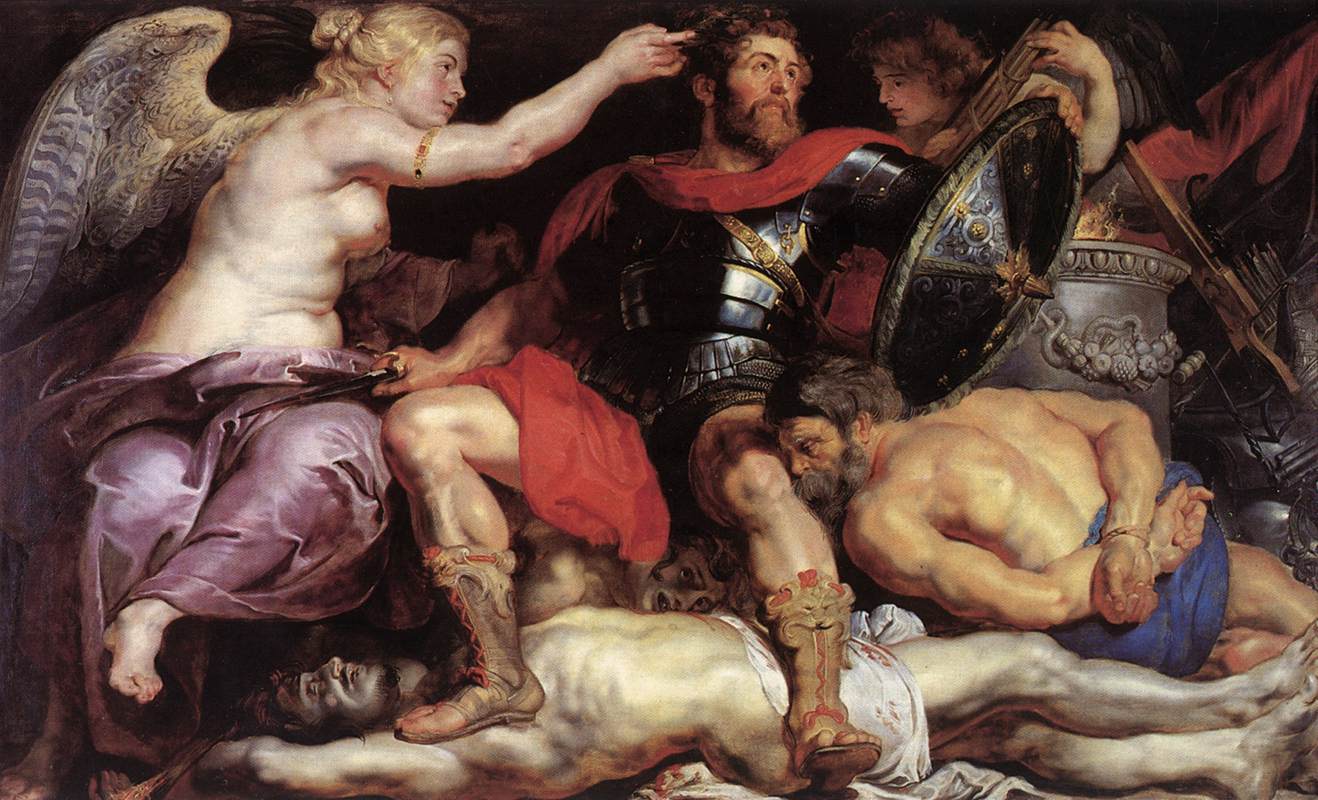|
Rodrigo De Borja (Spanish Noble)
Rodrigo de Borja (born 1349; date of death unknown) was a Spanish noble of the prestigious House of Borja in the Kingdom of Valencia whose origin was in the town of Borja in Aragon. He was head of house for this branch of the Borja family based on Ventres street in Xàtiva, the same branch which would later go on to become the Borgia family in Italy. Biography Rodrigo de Borja was born in 1349 in Xàtiva, Kingdom of Valencia. He was the son of Gonzalo Gil de Borja, who served as Jury of the Military Establishment of Xàtiva in 1340, and his wife whose name is not known. His paternal grandfather was Gil de Borja, also of Xàtiva and head of the House of Borja residing on Ventres street. His paternal great grandfather, Rodrigo de Borja, the presumed founder of their branch of House of Borja, participated in the Conquest of Orihuela in 1272. Rodrigo's great grandson would go on to become Pope Alexander VI. Marriage and descendants Rodrigo de Borja married Sabina Anglesola Sabina ... [...More Info...] [...Related Items...] OR: [Wikipedia] [Google] [Baidu] |
House Of Borja
The House of Borgia ( , ; Spanish language, Spanish and an, Borja ; ca-valencia, Borja ) was an Italian-Aragonese Spanish noble family, which rose to prominence during the Italian Renaissance. They were from Valencia, the surname being a Toponymic surname, toponymic from the town of Borja, Zaragoza, Borja, then in the Crown of Aragon, in Spain. The Borgias became prominent in ecclesiastical and political affairs in the 15th and 16th centuries, producing two popes: Alfons de Borja, who ruled as Pope Callixtus III during 1455–1458, and Rodrigo Lanzol Borgia, as Pope Alexander VI, during 1492–1503. Especially during the reign of Alexander VI, they were suspected of many crimes, including adultery, incest, simony, theft, bribery, and murder (especially murder by arsenic poisoning). Because of their grasping for power, they made enemies of the House of Medici, Medici, the House of Sforza, Sforza, and the Dominican friar Girolamo Savonarola, among others. They were also patrons o ... [...More Info...] [...Related Items...] OR: [Wikipedia] [Google] [Baidu] |
Borja, Aragon
Borja is a town and municipality in the province of Zaragoza, community of Aragon, northeastern Spain. As of 2014, its population was 4,931. Geography The municipality borders with Ablitas (in Navarre) Agón, Ainzón, Alberite de San Juan, Albeta, Ambel, Bulbuente, El Buste, Fréscano, Magallón, Maleján, Mallén, Tabuenca, Tarazona, and Vera de Moncayo. It is the administrative seat of the comarca of Campo de Borja. History The town's origins date back to the fifth century BC, because this is when a Celtiberian settlement known as Bursau or Bursao had existed near the current ruins of the castle. After the Roman conquest (first century BC) also the slopes of the hill were populated, though the town started to expand significantly only after the Muslim conquest in the eighth century AD. In the twelfth century it was conquered by the Christians from the north, and in the fifteenth/16th centuries it was converted into a military fortress against the Castillan invas ... [...More Info...] [...Related Items...] OR: [Wikipedia] [Google] [Baidu] |
Xàtiva
Xàtiva (, es, Játiva ) is a town in eastern Spain, in the province of Valencia, on the right (western) bank of the river Albaida and at the junction of the Valencia–Murcia and Valencia Albacete railways. It is located 25 km west of the Mediterranean Sea. During the Al-Andalus Islamic era, Arabs brought the technology to manufacture paper to Xàtiva. In the 12th century, Xàtiva was known for its schools, education, and learning circles. Islamic scholar Abu Ishaq al-Shatibi's last name refers to Xàtiva where he lived and died. After the Reconquista by Northern Christian kingdoms and the following Christian repopulation, the city became the cradle of one of the most powerful and controversial families of the Renaissance, the House of Borgia, which produced Popes like Callixtus III (Alfonso de Borgia) and Alexander VI (Rodrigo de Borgia). History Xàtiva (''Saetabis'' in Latin) was famous in Roman times for its linen fabrics, mentioned by the Latin poets Ovid and C ... [...More Info...] [...Related Items...] OR: [Wikipedia] [Google] [Baidu] |
Borgia
The House of Borgia ( , ; Spanish and an, Borja ; ca-valencia, Borja ) was an Italian-Aragonese Spanish noble family, which rose to prominence during the Italian Renaissance. They were from Valencia, the surname being a toponymic from the town of Borja, then in the Crown of Aragon, in Spain. The Borgias became prominent in ecclesiastical and political affairs in the 15th and 16th centuries, producing two popes: Alfons de Borja, who ruled as Pope Callixtus III during 1455–1458, and Rodrigo Lanzol Borgia, as Pope Alexander VI, during 1492–1503. Especially during the reign of Alexander VI, they were suspected of many crimes, including adultery, incest, simony, theft, bribery, and murder (especially murder by arsenic poisoning). Because of their grasping for power, they made enemies of the Medici, the Sforza, and the Dominican friar Girolamo Savonarola, among others. They were also patrons of the arts who contributed to the development of Renaissance art. The Borgia family s ... [...More Info...] [...Related Items...] OR: [Wikipedia] [Google] [Baidu] |
Italy
Italy ( it, Italia ), officially the Italian Republic, ) or the Republic of Italy, is a country in Southern Europe. It is located in the middle of the Mediterranean Sea, and its territory largely coincides with the homonymous geographical region. Italy is also considered part of Western Europe, and shares land borders with France, Switzerland, Austria, Slovenia and the enclaved microstates of Vatican City and San Marino. It has a territorial exclave in Switzerland, Campione. Italy covers an area of , with a population of over 60 million. It is the third-most populous member state of the European Union, the sixth-most populous country in Europe, and the tenth-largest country in the continent by land area. Italy's capital and largest city is Rome. Italy was the native place of many civilizations such as the Italic peoples and the Etruscans, while due to its central geographic location in Southern Europe and the Mediterranean, the country has also historically been home ... [...More Info...] [...Related Items...] OR: [Wikipedia] [Google] [Baidu] |
Kingdom Of Valencia
Kingdom commonly refers to: * A monarchy ruled by a king or queen * Kingdom (biology), a category in biological taxonomy Kingdom may also refer to: Arts and media Television * ''Kingdom'' (British TV series), a 2007 British television drama starring Stephen Fry * ''Kingdom'' (American TV series), a 2014 US television drama starring Frank Grillo * ''Kingdom'' (South Korean TV series), a 2019 South Korean television series *'' Kingdom: Legendary War'', a 2021 South Korean television series Music * Kingdom (group), a South Korean boy group * ''Kingdom'' (Koda Kumi album), 2008 * ''Kingdom'' (Bilal Hassani album), 2019 * ''Kingdom'' (Covenant Worship album), 2014 * ''Kingdoms'' (Life in Your Way album), 2011 * ''Kingdoms'' (Broadway album), 2009 * ''Kingdom'' (EP), a 1998 EP by Vader * "Kingdom" (Dave Gahan song), 2007 * "Kingdom" (Maverick City Music and Kirk Franklin song), 2022 * "Kingdom", a song by Battle Beast on their 2013 album '' Battle Beast'' * "Kingdom", a so ... [...More Info...] [...Related Items...] OR: [Wikipedia] [Google] [Baidu] |
Gonzalo Gil De Borja (b , a name
{{disambiguation, geo ...
Gonzalo may refer to: * Gonzalo (name) * Gonzalo, Dominican Republic, a small town * Isla Gonzalo, a subantarctic island operated by the Chilean Navy * Hurricane Gonzalo, 2014 See also * Gonzalez (other) * Gonzales (other) * Gonsalves (other) * Gonçalves Gonçalves (; Portuguese for "son of Gonçalo") is a Portuguese surname. Notable people with the surname include: * Adílio de Oliveira Gonçalves (born 1956), Brazilian footballer * Ailton Goncalves da Silva (born 1973), Brazilian footballer * ... [...More Info...] [...Related Items...] OR: [Wikipedia] [Google] [Baidu] |
Rodrigo De Borja (soldier)
Pope Alexander VI ( it, Alessandro VI, va, Alexandre VI, es, Alejandro VI; born Rodrigo de Borja; ca-valencia, Roderic Llançol i de Borja ; es, Rodrigo Lanzol y de Borja, lang ; 1431 – 18 August 1503) was head of the Catholic Church and ruler of the Papal States from 11 August 1492 until his death in 1503. Born into the prominent Borgia family in Xàtiva under the Crown of Aragon (now Spain), Rodrigo studied law at the University of Bologna. He was ordained deacon and made a cardinal in 1456 after the election of his uncle as Pope Callixtus III, and a year later he became vice-chancellor of the Catholic Church. He proceeded to serve in the Curia under the next four popes, acquiring significant influence and wealth in the process. In 1492, Rodrigo was elected pope, taking the name Alexander VI. Alexander's papal bulls of 1493 confirmed or reconfirmed the rights of the Spanish crown in the New World following the finds of Christopher Columbus in 1492. During the sec ... [...More Info...] [...Related Items...] OR: [Wikipedia] [Google] [Baidu] |
Conquest Of Orihuela
Conquest is the act of military subjugation of an enemy by force of arms. Military history provides many examples of conquest: the Roman conquest of Britain, the Mauryan conquest of Afghanistan and of vast areas of the Indian subcontinent, the Spanish conquest of the Aztec Empire and various Muslim conquests, to mention just a few. The Norman conquest of England provides an example: it built on cultural ties, led to the subjugation of the Kingdom of England to Norman control and brought William the Conqueror to the English throne in 1066. Conquest may link in some ways with colonialism. England, for example, experienced phases and areas of Anglo-Saxon, Viking and Franco-Norman colonisation and conquest. Methods of conquest The Ottomans used a method of gradual, non-military conquest in which they established suzerainty over their neighbours and then displaced their ruling dynasties. This concept was first systematized by Halil İnalcık. Conquests of this sort did no ... [...More Info...] [...Related Items...] OR: [Wikipedia] [Google] [Baidu] |
Pope Alexander VI
Pope Alexander VI ( it, Alessandro VI, va, Alexandre VI, es, Alejandro VI; born Rodrigo de Borja; ca-valencia, Roderic Llançol i de Borja ; es, Rodrigo Lanzol y de Borja, lang ; 1431 – 18 August 1503) was head of the Catholic Church and ruler of the Papal States from 11 August 1492 until his death in 1503. Born into the prominent House of Borgia, Borgia family in Xàtiva under the Crown of Aragon (now Spain), Rodrigo studied law at the University of Bologna. He was ordained deacon and made a Cardinal (Catholic Church), cardinal in 1456 after the election of his uncle as Pope Callixtus III, and a year later he became Apostolic Chancery, vice-chancellor of the Catholic Church. He proceeded to serve in the Roman Curia, Curia under the next four popes, acquiring significant influence and wealth in the process. In 1492, Rodrigo was elected pope, taking the name Alexander VI. Alexander's Inter caetera, papal bulls of 1493 confirmed or reconfirmed the rights of the Spanis ... [...More Info...] [...Related Items...] OR: [Wikipedia] [Google] [Baidu] |
Sabina Anglesola
Sabina may refer to: Places and jurisdictions * Sabina (region), region and place in Italy, and hence: * the now Suburbicarian Diocese of Sabina (-Poggio Mirteto), Italy * Magliano Sabina, city, Italy * Pozzaglia Sabina, city, Italy *Fara Sabina, a commune in the Province of Rieti, Lazio, Italy *Palombara Sabina, a town and commune in the province of Rome, Italy *Sabinas Hidalgo, a municipality in Nuevo León, Mexico *Sabinas, Coahuila, a municipality in Mexico *Sabina, Illinois, unincorporated community, United States *Sabina, Ohio, village, United States *Sabina Park, Kingston, Jamaica * Šabina, region in the Sokolov District, Czech Republic *Al-Sabinah, a town in Rif Dimashq governorate, Syria People Antiquity * Poppaea Sabina (30–65), wife of the emperor Nero * Vibia Sabina (83–136/137), wife of the emperor Hadrian, posthumously deified as ''diva Sabina'' * Saint Sabina, dedicatee of the basilica of Santa Sabina Given name *Sabina Aufenwerth (1706–1782), Germa ... [...More Info...] [...Related Items...] OR: [Wikipedia] [Google] [Baidu] |
Francesca D'Oms De Fenollet
Francesca is an Italian female given name, derived from the Latin male name '' Franciscus'' meaning 'the Frenchman' It is widely used in most Romance languages, including Italian, French and Catalan, and place of origin is Italy. It is derived from the same source as the female name '' Frances'', and the male names '' Francesc'', '' Francesco'' and ''Francis''. People named Francesca *Daniel Francesca, Danish esports player *Francesca Alderisi, Italian television presenter and politician *Francesca Allinson, English author and musician *Francesca Annis, British actress * Julia Francesca Barretto, Filipino actress * Francesca Battistelli, American Christian musician * Francesca Beard, Malaysian performance poet *Francesca Caccini, Italian composer and singer of the early Baroque * Francesca Anna Canfield, American poet and translator *Francesca Capaldi, American child actress *Francesca Cumani, English racing presenter for ITV *Francesca Cuzzoni, Italian operatic soprano *Franc ... [...More Info...] [...Related Items...] OR: [Wikipedia] [Google] [Baidu] |




.jpg)